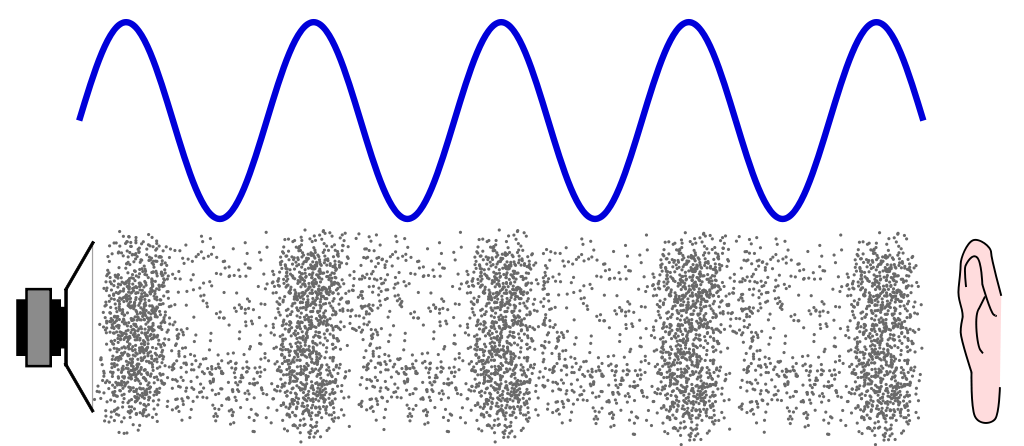Sound: Here is Why Your Voice Can go Further on a Cold Day
Have you ever been asked, while making a phone call, if you are in a bathroom? Most of the times the caller may be right. Do you ever wonder why the caller may feel you are in a bathroom? It could be you are in a room or hall. But wherever you are there are less furniture/ household items to absorb the sound waves from bouncing off the wall and producing an echo.
I don't know if you have noticed this, but our voice tends to go further during the cold chilly days as compared to the normal. You could hear a pin drop from some blocks away. The same sound travels faster through the warm air.

Wikipedia Creative Commons: Sound waves
As a kid growing up, we didn't have the internet and satellite TVs. So we devised different games that kept us busy. If you had read my earlier posts when I first joined steemit, you would be familiar with some of the games. We invented most of the games we played. However, the game I want to talk about was invented by an unknown person. It involves two tin cans and a string.
We used two empty pasteurised milk tins of which we would cut out one end. We bore a hole in the remaining side of the two cans and connected them with a string preferably a thick, sturdy string.
We did not know, neither did we care, how it worked. But when someone standing on one end said something, the kid on the other side of the "telephone" hears what has been said. That's magic, or so we thought.
But this is what happens with the tin can telephone "magic."
When a kid on one end of the taut string makes a speech, the voice vibrates the air within the first tin, and this vibration travels along the tight line to the other tin and vibrates the air within the second tin such that the child at the end would hear what has been said.
The big question is why didn't we just use the two tin cans separated by a distance to communicate? The answer to this question is the object of this post.
The phrase as quiet as the graveyard shows that whosoever came up with that phrase never visited the outer space. Sound waves could travel virtually in all type of medium, but it can't just get through a vacuum. Unfortunately, (or fortunately, if you are an astronaut who hates noise) outer space is super quiet due to its vacuum nature.
We may be familiar with the speed of light that is 299,792,458 meters per second (m/s) which is usually approximated to 3.00×108 m/s.
Now that brings us to the next question, what is the speed of sound?
My elementary science teacher, who of course is a genius, made us know there is no actual speed of sound. Ok. Hold your horses, what he means is that speed of sound is dependent on the medium that the sound waves are passing through and at what temperature.
The speed of sound in dry air is 343 m/s at 20°C. At the same temperature in water, the speed of sound is 1482 m/s.
The speed of sound changes with a change in medium. That is because sound waves is a pressure wave and have to push through the molecules in the medium it is propagating to get its destination. So its speed is heavily dependent on what the particles are like in the medium of propagation.
The speed of sound could be noticed to be faster in objects with some stiffness, for instance, the speed is more rapid in steel than in wood. It is also quicker in solids and liquids than in gases.
That is why sound travels slower in the air (343m/s) but travels faster in steel (6100 m/s) than in an oak wood (3850 m/s).
The type of medium is not the only thing that affects how sound waves travels as temperature plays a significant role too in its transit through the air. The high humidity reduces the density of air and sound could move faster.
This becomes easier when you recall that density = mass/volume
Water-saturated air due to the high humidity affects the density of air as it is relatively lighter than other constituents of air such as diatomic oxygen and diatomic nitrogen. The more there is water vapour, the more oxygen and nitrogen decreases per unit volume; the air density decreases as it is directly proportional to the mass (which is falling too).
I bet this fact must have spoilt one or two assumptions especially people that feel moist air or humid air is "heavier." I guess this assumption probably came from how difficult it is to breathe moist air compared to the dry air.
The hot air makes air molecules to move faster making it easier for the sound wave, which is a pressure wave, to navigate through the excited air molecules more quickly compared to a slower moving molecule of air that is not heated.
Refraction in light vs Refraction in Sound
The pencil in this clear glass of water appears to be bent due to refraction. The light travels in a straight line, but when it passes through a second medium, the light path bends. What happens is that the speed of light slows down in the water producing the bent pencil phenomenon.
The pencil's bend is toward the air-water boundary due to light being slower in water. The reverse happens when sound waves travel from a slow medium to a fast medium, it reverses; that is bends away from the boundary.
Sound wave propagation behaviour in different medium temperature
During that cold day, if you call out to get the attention of that your dog that is sitting somewhere ahead of you, the sound waves that would have been scattered in all directions would be refracted. This refraction was from the warmer upper layer that is above the cold area near to the ground. This bend on the sound wave downwards makes it travel faster in chilly weather due to above.
If it is during winter time, the snow could also act as a sound absorber, giving you the effect of being in a sound studio or at least a room filled with things free from reverberating sounds.
References
If you write STEM (Science, Technology, Engineering, and Mathematics) related posts, consider joining #steemSTEM on steemit chat. If you are from Nigeria, you may want to include the #stemng tag in your post. You can visit this blog by @stemng for more details. You can also check this blog post by @steemstem here and this guidelines here for help on how to be a member of @steemstem.

)


)
)
I guess we don't have much coldness around here to notice the difference. But your post answers other questions I had about why sound travels faster in water than air.
A very detailed post with personal experience to spice it up. Thanks for sharing.
Thanks for the kind compliments and it is a pleasure to share such things.
Well, there is a speed of sound, as this is a well-defined quantity. But as you said, this quantity is not a constant.
Nice post by the way :)
You are absolutely right on point.
There is nothing more fascinating ,than being here , i am already recalling forgotten , science theories and technology. Looking forward to grabbing my mathematical theories . Thanks for sharing
Thank you too for reading.
Yes, sound travels fast and revibrate/resounance in an enclosed room which is empty. One tends to over heard himself/herself when speaking in an empty room. The atmospheric pressure during the cold weather is must time humid and thin making a fast travel of sound possible. Your voice sound travels so fast at the dread of the night due to less activities around and a relatively calm and cold environment.
When the reflection of a light hit a certain medium it definitely refracted around the surface and causing the bend for the light travelling.
Thanks @greenrun. Another refreshing of memory to the then SS class physics.
Thanks for that insightful comment on sound waves, refraction and reflection. Steem on
Wow!! Interesting piece of write up there...
No wonder its usually quiet outside in the morning during harmattan(if u live in naija) periods..
Moreover, you'll hardly find persons outside in the mornings because of the cold, so there would be fewer cars, or things to absorb the sound
Thanks for dropping by and for your comments too.
Great explanation, but I'm not following why refraction of sound downwards rather than upwards makes it faster. I get that you'll be able to hear sound better in cold weather, but that doesn't explain the speed difference. Maybe I'm missing something.
The sound waves would otherwise be scattered if not for the refraction. So with the refracted sound waves, the sound waves are further amplified(more focused) hence could travel a further distance. Thanks a lot.
this is wonderful, i remember those days as a child , i got involved in the tins stuff but i never had a prove about how it works but this is a clear underrstanding of my child hood ages , good work man
Thanks a lot
When you mentioned the tin can telephone, I realized how much of childhood we've missed. For some of us, this was an unknown practical application of science. Unfortunately, the current generation do not have a first hand encounter of most of these childhood experiences.
Wonderful post, well done @greenrun
Quite impressive
It is always good to have a fantastic childhood with whatever is obtainable as a means of being happy or active. Thanks for your input
Forgive me my head is quite full today but I'd like to say you make a great teacher. Well done.
Take sometime and relax
Thank you.
Wow. Thanks for this wonderful write.
So educating.
Have you ever been asked, while making a phone call, if you are in a bathroom?
Yea have been asked this.it makes the voice so clear, and it re-echoes back to you.
Thank you for reading